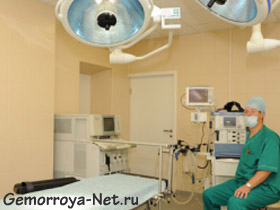hemorrhoids stage
 Like most diseases, noted for acute and chronic. With characteristic differences: expressed and strongly disturbing symptoms in acute onset, and erased unexpressed signs of disease, so it is more dangerous. It is in the chronic course of the disease distinguish several stages of development:
Like most diseases, noted for acute and chronic. With characteristic differences: expressed and strongly disturbing symptoms in acute onset, and erased unexpressed signs of disease, so it is more dangerous. It is in the chronic course of the disease distinguish several stages of development:
- 1 stage - pronounced bleeding, raspiranie and pain, without loss of hemorrhoids, they are small and are located inside.
- 2 stage - spontaneously reposition nodes, dropped out during defecation, discomfort and soreness are growing.
- 3 stage - loss occurs at the slightest attempt to push, or squat, but the nodes can be adjusted independently using various methods.
- 4 stage – irreversible loss of nodes, even when coughing or sneezing, complications appearance – festering and thrombosis, anemia, considerable difficulty in the act of defecation, you need surgery.
types of diagnosis
Primary blood test, coprogram and digital research. And for further diagnosis, depending on the stage and location of nodes - rectoscopy, sigmoidoscopy or colonoscopy. These methods are the most reliable and Applicability.
Conservative treatment
Valid on the first two stages. Diet (gentle composition, mind cooking and flavoring inertia), rectal antipyretic and hormonal candles, painkillers gels, ointment with anticoagulants, Tablets flebotoniki, improves blood mikrotserkulyatsiyu (Detroleks, Flebodia, ginkor forte). Sit-baths and herbal microclysters. Special gymnastic exercises or physiotherapy. Careful and frequent hygiene douching anal canal.
Surgical removal of hemorrhoids
Surgical treatment of hemorrhoids, technical, This excision of hemorrhoids. It is used often, since patients usually go to the doctor at a late (3-4) stage and ineffective palliative treatment. Since nodes have very large, trombirovanы, infected and inflamed. However, there are contraindications to surgery: oncological diseases of different localization, heart failure, diabetes, immusupressivnye state and inflammatory bowel disease (kollity, duodenal ulcer) and, of course, pregnancy.
Preparation for surgery
Preparation for surgery includes: contraindications exception, a number of cleaning procedures (laxatives, enema), neobilnye digestible dietary food, necessary for the operation hygiene. Delivery of the required set of analyzes and, possibly, preventive anti-inflammatory therapy to relieve post-operative period.
Methods for removal of hemorrhoids
In case of contraindications for surgery, the following are considered minimally invasive intervention: different kinds of temperature effects – coagulation (laser, photocoagulation, monokoagulyatsiya and bipolyarnaya) or cryodestruction, and chemical treatment (sklerozirovanie), as well as mechanical interference - ligation of vessels and dezarterizatsiya. Let us briefly consider each.
- Sclerosis - filling pathologically altered node vessels solution, vessels are fallen down and do not allow blood to fill the portion of pathological changes.
- Cryodestruction - the impact of extremely low temperatures, causing local tissue freezing zone modified.
- infrared photocoagulation - fiber with high critical temperature in the tip next local node moxibustion.
- ligation - latex mechanical squeezing ring until the termination of blood flow and the natural host rejection.
- Dezarterizatsiya - hemorrhoidal artery ligation under control Doppler
- Coagulation - standartnaya hemoroydэktomyya, but instead of a scalpel coagulator.
- Bipolar coagulation - held LigaSure device, It occurs cellular effects on collagen tissue, its sintering. Tripe neater and less post-operative pain.
Laser intervention deserves special attention. The operation takes 15-20 min, when it occurs at the same time low-impact excision and subsequent coagulation with one tool, absolutely painless during and after the intervention, with a very short recovery period and minimal side effects. Leaves no scarring and discomfort. But indications are limited - difficult to remove major parts. Even deciding on surgery, over the next 5 s possible predicted relapse. And this technique is quite expensive.
surgical: Classical operation method Longo, hemorrhoidectomy, conventional and radio-wave method (operation radioluchevym scalpel, affecting radio waves).
Surgery is carried out around 20% patients. Hemoroydэktomyya scalpel simple and popular, but it is extremely painful. Sutures after surgery delivered unbearable pain patients, forcing many to take analgesics.
Longo operation involves removing the entire altered rectal mucosa, which eliminates the possibility of recurrence in the future.
Back to normal life is possible through comfort 2 of the week, in strict compliance with diet and proper care for post-operative wounds. If there is pain, and expressed difficulties in the administration of the natural functions (urination, defecation), You should consult your doctor in order to avoid complications after surgery. Such as, bleeding, a possible secondary anal incontinence, narrowing of the anal canal, of infection and abscess, Education fistula, phobia when you try to go to the toilet.









Leave a Reply